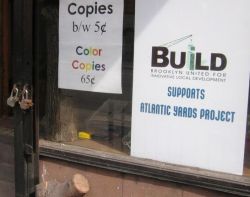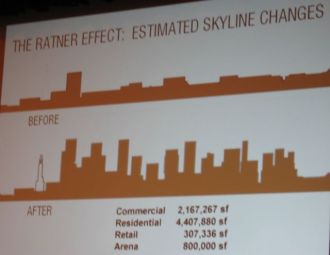 [PICTURED: Marshall Brown.]
[PICTURED: Marshall Brown.]
Most of this should be considered paraphrase, though much of it is quotes, verbatim:
Marshall Brown presentation of the UNITY plan, an alternative take on the Atlantic Yards project.
GIB VECONI: This is the opposite of the planning process that has taken place at Atlantic Yards with respect to community participation. The input of the community has not been sought. On the other hand, the UNITY plan came out of a community participation process.
Brown: Development can’t just be about money … we have been working with Tish James and community groups for the past year on this idea: urban planning … specific goals: shift discussion away from the arena and back toward our community. We have been “somewhat” successful but now the goals need to change a bit.
There has been a lot of division in the community over Atlantic Yards, but we share the same goal and in the end can reach them with a collaborative model… we have to get very active. What we are going to do: before the end of the month, hold another workshop where we bring together the leaders of the different groups and organizations we have worked with, get them in a room, see if we can develop a joint plan of action to address and deal with this problem. The time for waiting has really passed.
Q. Bottom line, have any developers shown interest in this? Is there anyone that’s… has anyone put up money? No, absolutely not. Have there been discussions with developers through Tish James’ office? Yes. Do developers think it’s feasible, yes, but we are encountering same difficulties they encountered on the west side. It’s difficult to engourage developers to step forward when there’s another project on the table. Developers follow a “gentleman’s agreement”: When one has a project on the table, others are loathe to step forward to critique it or offer other other proposals. “If we are waiting for Robin Hood or Tarzan to come swinging out of the trees and save us on this one, I think we might be in trouble.”
…Sorry if I don’t sound rosy and charming this evening, but I have deep concerns about what I see happening on that side of the river and this side of the river. We have to move. There is not really much more time to wait.
Veconi: I share a number of Marshall’s concerns about recent events… (but) there is actually in my view some cause for some optimism … although it has taken some time for community groups to come together, that is absolutely happening at this point.
Dan Goldstein (?): Shaya Boymelgreen sold (two small lots to Ratner) for $44 million, … to me, that says these yards are very valuable, but as of right now, there is no open bidding process. Aside from looking for fearless developers … we have to get the MTA, not to quietly say in a semi-public letter to FRC … (but publicly state) that they will accept bids. Then maybe some developers will step up.
q. Do you plan to put a community benefits agreement (CBA) included in your plan? There is another community that seems to be excluded that nobody seems to recognize. We need jobs. Brown: for us, CBA is a bit of a moot point. CBA is a tool largely used by developers to put a patch on what’s a much larger problem. In a lot of cases, they don’t work. They are necessary when there are no community benefits inherent to a project. We are trying to come at it a different way … the project should at its core be a civic project with civic benefits, from the beginning, period.
Brown suggests “let’s learn how to fish” rather than taking fish from Ratner, to which an audience member responds: “You go tell those young people that … Some of them don’t have the skills to have their own business. Because of that, right now, they need a job, some place to work.”
Brown: Yes, people need jobs, they have to eat today, but $7 an hour at Target doesn’t feed children, … doesn’t pay a mortgage … We agree there are short-term and long-term problems, but we need to look at the entire range.
–FIN–


 [PICTURED: Marshall Brown.]
[PICTURED: Marshall Brown.]
 Ten days ago (six years ago in Internet Time), the
Ten days ago (six years ago in Internet Time), the 